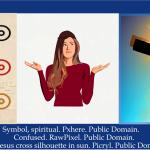I love reading. A funny thing happened when I was young. Because of my diagnosis of ADHD in the 80’s and a general misunderstanding of what ADHD was, I was lumped educationally with children who often had more severe learning disabilities. Because of this, I had to go to special reading and math classes for almost all of my childhood educational career. In 86 or so, from what I can deduce from research I did in college, I scored particularly well on the reading portion of California Achievement Test and found myself part of a longitudinal study on ADHD. Apparently, my score confounded the then understanding of what a child was capable of with ADHD. I am not entirely certain, because at the time of my research in college, there were multiple studies on ADHD.
As a Christian, I never was a sword drill champion. I remember last year, when I was teaching philosophy, I ran across a tidbit of history that talked about how Socrates did not like the written word, a fairly new invention in his time. Socrates also objected to writing because it was not interactive. According to Socrates, writing cannot answer questions the way a real live human being can. If you ask a piece of paper something, all it can do is repeat the same words over and over. Writing, Socrates told his companion Phaedrus over and over again, is like a broken record. For me, rote memory of scripture never did anything for me.
What is Lectio?
I was introduced into lectio divina or reflective reading while in college, somewhere in my discernment process of becoming a priest/monk.
If you look up the definition of lectio, you might find something like this:
Lectio divina is a contemplative practice with its Christian roots in the Benedictine tradition. It combines slow, conscious reading of a biblical or sacred text with contemplation and silent prayer. It is meant to promote communication with God and a deeper knowledge of Christ, in our lives today.
During Lectio Divina we put aside thoughts of studying the text. This is not the time to consider the historical or theological meanings of what we are reading. We read with a willingness to enter into text in a felt sense. The purpose of this practice is to hear, in silence, the word of God, in this moment. What, through this reading, is God saying to me right now? What do I hear that helps me know what it means to walk the Christ path today?
I am a dad of four kids, a full-time job, and a part time job. I do not usually have time for slow. I am usually trying to get my home practice in before everyone wakes up and disrupts my calm. Instead, as a practice over the years, I have used the time before I go to work to devote to some time of reflective reading or in the most recent years, listening of a podcast.
Christianity in the modern Western sense has gotten lost in having the right words, at the right time. Sound doctrine over a sound relationship with the Holy Spirit. Lectio challenges this. When I read the Psalms in the morning, I read prayers and poems I have read hundreds of times in my life. With the Holy Spirit’s movement, these words have a little bit of different meaning each time I experience them.
What are the benefits of lectio?
As I mentioned above, I was never a sword drill champion. I was never a pastor who could rattle off scripture like a prescription for a person’s spiritual ill. Often, I would frustrate my congregations by telling the story around the scripture passage of the day instead of actually reading the scripture. On of my fondest childhood memories was of watching my elders sitting around my great grandparent’s and grandparent’s kitchen table telling stories, especially the stories of my grandpa and his brother’s shenanigans when they were younger.
Lectio benefits our faith by taking static, proof texted and often literal translated scripture and brings them into contextual life and connects us more deeply with the author of the words we are reading. When I read a letter from Abraham Lincoln to Grant, I understand contextually a whole host of factors going both directions in the letter. I understand what Lincoln is feeling from his side of politics and I also understand what Grant is dealing with tactically as a general.
In the same way, scripture is the same way. When we read the stories of Jesus and his rag tag group of followers, contextually, we understand that this group of peasant teachers are defiantly going against so many societal norms. In the New Testament, the writers are often emphasizing care for the sick. Whether physically sick or mentally unwell, the Jesus movement offered hope for the hopeless in a time when the both the government and the religous officials offered no hope.
Five texts to try lectio with
Of the many hats I wear, one of them is as an Adjunct Professor of World Religions at our local Community College. I have been enamored with Pluralism and Deep Ecumenism since I was a college freshman. Here are five texts that I come back to regularly to help me in my lectio journey.
Psalms
At the heart of the Divine Office for the Order of Saint Benedict, we find the Psalms. In the Rule of Saint Benedict, chapter 18 and chapter 19 instruct the monks and the nuns on how to pray the Psalms throughout the day. I once read a commentary from a Benedictine that Benedictine’s learn the Psalms during their novitiate that they eventually naturally bubble forth from their being.
I tend to find that the Psalms are the most poorly understood book in the entire biblical canon. Many like to lump the entire book into a collection of poems and hymns and often miss the ontological significance of the different genres. In the Psalms, we find hymns of mourning, lamentation, thanksgiving, kingship and covenant psalms, songs of trust and wisdom psalms.
See this example
Marcus Aurelius’s Meditations
This is a book that I read at least once a year and most recently taught it in my Intro to Philosophy Class.
Meditations is a series of personal writings by Marcus Aurelius, Roman Emperor from AD 161 to 180, recording his private notes to himself and ideas on Stoic philosophy. This collection of notes and letters were never intended to be a stand alone book, rather, it is one man’s personal collection of ideas.
The Meditations thus exhibit the beliefs that the cosmos is a unity governed by an intelligence; that the human soul is a part of that divine intelligence; and that the soul can therefore stand, if naked and alone, at least pure, and undefiled, amid chaos and futility. For me, I read the Meditations at the beginning of the year to set the intention for the year. To not take myself too seriously, to embrace the impermanence of life and to focus on the things that matter.
J.R. Tolkien’s Lord of the Rings Trilogy
Starting around Thanksgiving, I make it a point to read through the entire trilogy. The Lord of the Rings is the saga of a group of sometimes reluctant heroes who set forth to save their world from consummate evil. Its many worlds and creatures were drawn from Tolkien’s extensive knowledge of philology and folklore. The Lord of the Rings trilogy has deep theological gems and parallel cultural references to Tolkien’s own experiences during World War I. Reading it every year as lectio brings out new learning and teachings on resilience and resolve. The Buddhists are tasked with living in such a way as to reduce the suffering of all sentient beings. Frodo and his team on their adventure arc live out this calling.
Rule of St. Benedict
Written around 530 CE by Benedict of Nursia, the Rule of St. Benedict was the ordering document for the monks and nuns that eventually followed Benedict’s teachings and guidance. The spirit of Saint Benedict’s Rule is summed up in the motto of the Benedictine Confederation: pax (“peace”) and the traditional ora et labora (“pray and work”).
There are two sources that I tend to lean into when studying the Rule of St. Benedict. The Monastery of Christ in the Desert offersoffers a digital version of the Rule. The author and nun, Joan Chittister offers a daily reflection of the Rule that I often use daily. Here, the Rule often sets the intention for my day. It can also offer direction when I welcome clients, whom I consider guests into my space each day.
My “fifth” book is always a surprise, I have so many in my collection. I try and start at least one new book a year. As I am a professor at a Community College and my practice as a therapist is an educational one, I am constantly reading. Reading intentionally with either my clients, my students or in the case of my blogging, my audience in mind is a daily practice. For over twenty years now, I have started my day with the reading of newspapers, magazine articles, books, and now podcasts with the intention of learning something of use to offer to those around me.
In a world where reading is not as in vogue as it once was, taking up a book and reading slowly, chewing on the words, digesting the words, and coming back for a second round can deepen our sense of wonder, curiosity, and awareness of the world at large.


















